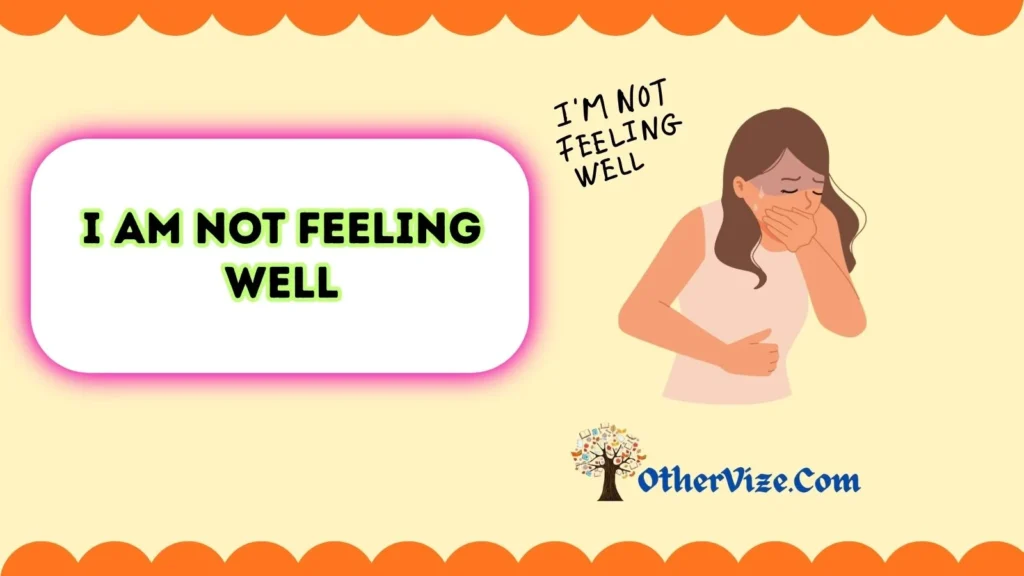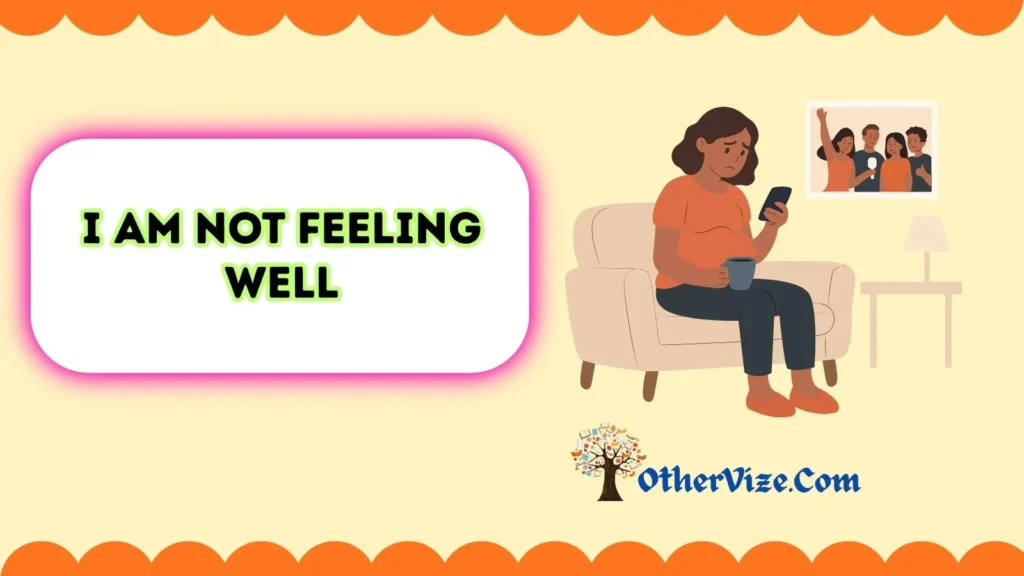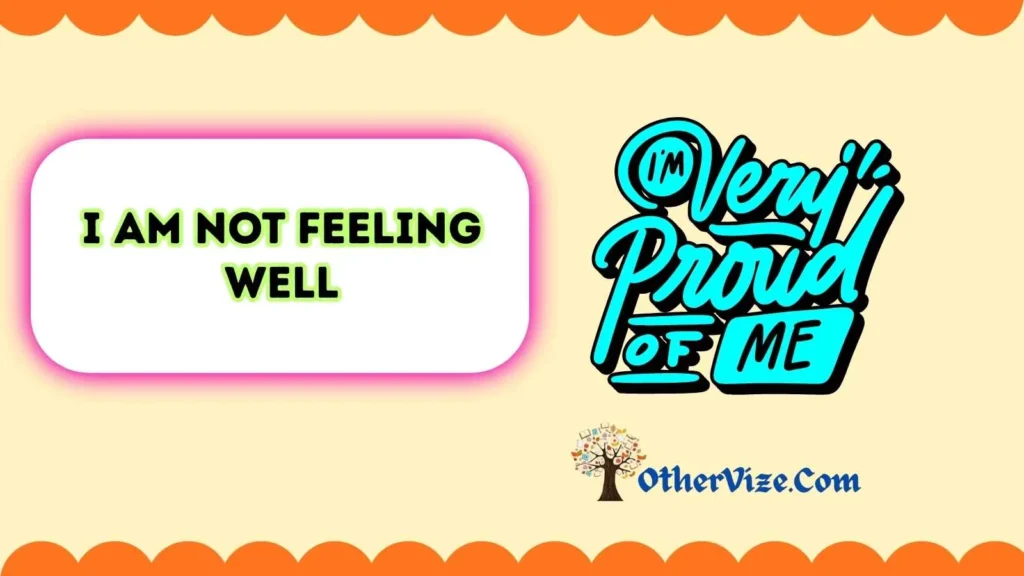Last updated on October 22nd, 2025 at 07:48 am
Saying “I am not feeling well” is a common way to express discomfort, but using the same phrase repeatedly can make conversations sound repetitive.
Whether you’re writing an email to your boss, informing a friend, or explaining your condition to a doctor, having alternative expressions can help convey the right level of seriousness or politeness.
In this blog post, we’ll explore 20 other ways to say “I am not feeling well”, helping you sound more natural and expressive in different situations.
These variations can also make your writing and speech more engaging.
20 Other Ways to Say “I Am Not Feeling Well”
- I’m under the weather
- I feel out of sorts
- I’m feeling off
- I’m not at my best
- I feel lousy
- I’m a bit unwell
- I’m feeling rough
- I don’t feel great
- I think I’m coming down with something
- I feel run down
- I’m feeling weak
- I’m feeling sickly
- I’m not myself today
- I feel like I’m burning up
- I feel dizzy and lightheaded
- I have a splitting headache
- I’m not feeling 100%
- I feel drained
- I’m feeling feverish
- I’m not in good shape today
1. I’m under the weather
Definition:
This phrase means you are feeling mildly ill, usually due to a cold, flu, or fatigue.
Description:
A casual and widely used expression, “under the weather” is perfect for informal situations when you don’t feel great but aren’t seriously ill.
Usage Examples:
- I won’t make it to work today—I’m under the weather.
- She skipped the party because she was under the weather.
2. I feel out of sorts
Definition:
This means you feel slightly unwell or not in your usual good health.
Description:
This phrase is often used when you’re experiencing discomfort or uneasiness but can’t pinpoint a specific illness.
Usage Examples:
- I woke up feeling out of sorts this morning.
- He looked out of sorts after the long flight.
3. I’m feeling off
Definition:
A simple way to say that you are not feeling normal or well.
Description:
This phrase is useful when you want to express discomfort without being too dramatic.
Usage Examples:
- I don’t know what’s wrong, but I’m feeling off today.
- She said she was feeling off and went home early.
4. I’m not at my best
Definition:
This phrase means you don’t feel as healthy or energetic as usual.
Description:
It’s a polite way to express feeling unwell, especially in professional or formal situations.
Usage Examples:
- I’ll do my best, but I’m not at my best today.
- He’s usually energetic, but he’s not at his best this morning.
5. I feel lousy
Definition:
This phrase conveys feeling very unwell or miserable.
Description:
“I feel lousy” is informal and often used when you’re experiencing cold, flu, or general exhaustion.
Usage Examples:
- I didn’t sleep well last night, and now I feel lousy.
- After eating that bad seafood, I felt lousy all day.
6. I’m a bit unwell
Definition:
A polite way to say that you are feeling sick.
Description:
This phrase is ideal for professional settings when you don’t want to sound overly dramatic.
Usage Examples:
- I’m a bit unwell, so I’ll be taking the day off.
- She mentioned that she was a bit unwell and stayed home.
7. I’m feeling rough
Definition:
This phrase means you are feeling sick or weak.
Description:
It’s often used in casual speech, especially to describe mild illnesses or the aftermath of a long day.
Usage Examples:
- I have a headache, and I’m feeling rough today.
- He’s been feeling rough since yesterday.
8. I don’t feel great
Definition:
A simple and direct way to express feeling unwell.
Description:
This phrase is useful when you don’t want to elaborate too much on your condition.
Usage Examples:
- I think I’ll rest—I don’t feel great.
- She said she doesn’t feel great and left early.
9. I think I’m coming down with something
Definition:
This means you feel the early symptoms of an illness.
Description:
This phrase is often used when you sense that a cold, flu, or another sickness is starting.
Usage Examples:
- My throat hurts—I think I’m coming down with something.
- He was sneezing all day and said he might be coming down with something.
10. I feel run down
Definition:
To feel exhausted or weakened, often from stress or illness.
Description:
This phrase is commonly used when illness is linked to overwork or lack of rest.
Usage Examples:
- I’ve been working too much and feel run down.
- She’s been traveling a lot and is feeling run down.
11. I’m feeling weak
Definition:
This phrase means you lack physical strength, often due to illness or fatigue.
Description:
Feeling weak can be a symptom of exhaustion, dehydration, or an underlying health issue. This phrase is commonly used when you don’t have the energy to complete daily tasks.
Usage Examples:
- I haven’t eaten all day, and now I’m feeling weak.
- After running a fever for two days, she was feeling weak.
12. I’m feeling sickly
Definition:
A way to say that you feel constantly unwell or fragile.
Description:
This phrase often describes a general state of poor health rather than a specific illness. It’s commonly used for chronic conditions or persistent sickness.
Usage Examples:
- I’ve been feeling sickly all week, so I should see a doctor.
- He looked sickly and pale after staying up all night.
13. I’m not myself today
Definition:
This phrase means you feel unwell or different from your usual state.
Description:
It’s a polite and indirect way to express that something feels off, whether physically or mentally.
Usage Examples:
- I’m sorry if I seem distant—I’m just not myself today.
- She’s usually energetic, but she’s not herself today.
14. I feel like I’m burning up
Definition:
This phrase means you feel extremely hot, usually due to a fever.
Description:
It’s often used when someone has flu-like symptoms and feels warmer than normal.
Usage Examples:
- Can you check my temperature? I feel like I’m burning up.
- He came home from work early because he felt like he was burning up.
15. I feel dizzy and lightheaded
Definition:
This means you feel unstable, like you might faint.
Description:
Dizziness and lightheadedness can result from dehydration, low blood sugar, or sudden illness.
Usage Examples:
- I need to sit down—I feel dizzy and lightheaded.
- She stood up too quickly and suddenly felt lightheaded.
16. I have a splitting headache
Definition:
This means you have an intense headache.
Description:
A “splitting headache” is often associated with migraines, stress, or dehydration.
Usage Examples:
- I need to lie down—I have a splitting headache.
- His splitting headache made it impossible to concentrate at work.
17. I’m not feeling 100%
Definition:
A casual way to say that you’re not in your best health.
Description:
This phrase is often used when you’re slightly unwell but not severely sick.
Usage Examples:
- I’ll still join the meeting, but I’m not feeling 100% today.
- She’s recovering from a cold and not feeling 100% yet.
18. I feel drained
Definition:
This means you feel exhausted, both physically and mentally.
Description:
Feeling drained can result from overwork, stress, or illness.
Usage Examples:
- After working overtime all week, I feel drained.
- He looked drained after his long flight.
19. I’m feeling feverish
Definition:
This means you feel warm and suspect you have a fever.
Description:
It’s a way to indicate that your body temperature feels higher than normal, often a symptom of the flu or an infection.
Usage Examples:
- I think I need to rest—I’m feeling feverish.
- She told the doctor she’d been feeling feverish all day.
20. I’m not in good shape today
Definition:
A general way to say you’re feeling unwell.
Description:
This phrase is suitable for informal and formal conversations when you want to indicate that you’re not feeling your best.
Usage Examples:
- I won’t be able to exercise today—I’m not in good shape.
- He had to cancel his meeting because he was not in good shape.
🩺 I Am Not Feeling Well Meaning

Definition:
To express that someone is unwell, uncomfortable, or not in their normal state of health — either physically or emotionally.
Description:
🌿 The phrase “I am not feeling well” is commonly used to indicate that a person is sick, tired, or emotionally drained. It’s a polite and socially acceptable way to inform others about one’s discomfort. Moreover, it can range from mild fatigue to more serious illness. In conversation, this phrase helps convey empathy, honesty, and self-awareness. Therefore, it’s suitable in both personal and professional contexts.
Usage Examples:
- 🤧 “I’m not feeling well today, so I’ll stay home and rest.”
- 😔 If you are not feeling well, it’s better to avoid stress and focus on recovery.
💬 I Am Not Feeling Well Message

Definition:
A short, polite message sent to inform someone — usually an employer, teacher, or friend — that you’re unwell and unable to attend work, school, or an event.
Description:
📩 This type of message should be clear, concise, and respectful. It communicates your condition while maintaining professionalism. Additionally, using words like unwell, ill, or under the weather keeps it gentle yet direct. Furthermore, mentioning gratitude or intent to update later adds a positive tone. Hence, it’s ideal for workplace or academic communication.
Usage Examples:
- 💻 “Good morning, I wanted to let you know that I’m not feeling well and won’t be able to come in today.”
- 📱 “I’m not feeling well, so I’ll take the day to rest and recover. I’ll update you tomorrow.”
🧠 I Am Not Feeling Well Synonym
Definition:
Alternative phrases that convey the same idea of being unwell, sick, or emotionally off-balance.
Description:
🌸 Synonyms for “I am not feeling well” help diversify your language, especially in emails or conversations. They make your message sound natural and considerate. Moreover, choosing the right phrase depends on context — formal or casual. Additionally, using softer expressions like “I’m feeling under the weather” or “I’m not myself today” adds empathy and variety to your speech.
Usage Examples:
- 🤒 I’m feeling a bit under the weather today.
- 😕 I don’t feel like myself; I think I need to rest.
💭 I Am Not Feeling Well Quotes

Definition:
Inspirational or relatable sayings that describe the feeling of being unwell — physically or mentally — often to bring comfort or humor.
Description:
✨ These quotes express emotions associated with illness or fatigue. They can be shared on social media, in messages, or personal reflections. Furthermore, they encourage self-care and empathy while reminding others that it’s okay to rest. In addition, motivational quotes help maintain a positive outlook even during tough times. Therefore, they are perfect for emotional connection and support.
Usage Examples:
- 💬 “It’s okay to not be okay. Take your time to heal.”
- 🌙 “Rest is not a waste of time; it’s part of the process.”
🏥 I Won’t Be Able to Come to Work Today Because I Am Not Feeling Well
Definition:
A professional way to inform your employer or manager that you are unwell and need to take a sick day.
Description:
📝 This sentence maintains courtesy while clearly explaining your absence. It balances professionalism and honesty. Moreover, starting with “I won’t be able to come to work today” sets the tone, while “because I am not feeling well” gives a brief reason. Additionally, it’s good etiquette to offer to catch up later or thank them for understanding. Therefore, this message shows both responsibility and respect.
Usage Examples:
- 📧 “I won’t be able to come to work today because I am not feeling well. I’ll inform you once I’m better.”
- 📲 “Good morning, I’m not feeling well today, so I’ll take a sick day. Thank you for your understanding.”
Conclusion:
Your health comes first! If you’re not feeling well, it’s important to prioritize rest and recovery.
Informing your employer promptly about your absence ensures transparency and helps maintain workflow efficiency.
Whether it’s a minor illness or something more serious, taking time to heal benefits both you and your workplace in the long run.
Always follow company policies for reporting sick leave and provide necessary updates if needed.
Remember, a well-rested and healthy you is the key to productivity. Take care, and get well soon!
